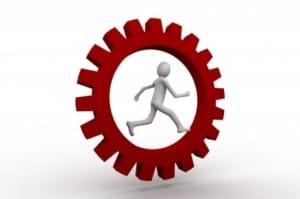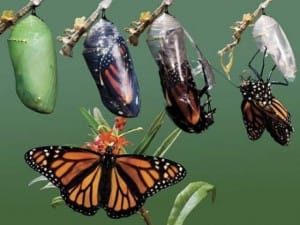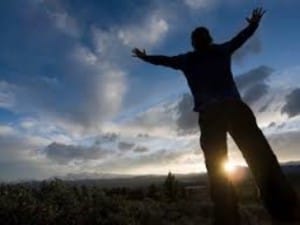
Humans are very adaptable. For example, we can survive on very little food. And with very little money. But when life suddenly takes a turn for the better, we don’t stay with our existing needs, we adapt very quickly to the new situation.
For example, when income increases, new desires immediately arise, which are then met with a cash injection. And when we eventually earn more, we do it all again… and again.
The fact is that over time, when we earn several times more than we used to, we can still be living the same way we did then: struggling to get by from month to month because we spend all our money on a regular basis… still not paying our bills regularly… still not saving, and so on.
The power of established habits

The same applies to the reverse situation, where things suddenly take a turn for the worse. Even then, we can organise and adapt quickly.
But it is interesting to observe what happens when these worse situations change back for the better: when we return to our old ways, our old habits automatically return too.
For example, if the financial situation suddenly deteriorates, we react immediately – we start spending less (and, surprisingly, we survive; moreover, often we don’t even feel that we have tightened our belt drastically). When the situation improves, or when our income increases, we don’t keep up these saving habits – and spend the extra money on something useful – but we start spending again, as we used to do.
Sometimes it’s just a choice, because we have two options that are realistic and feasible: either we keep the new habit, or we go back to the old ruts.
It is much harder to change your own beliefs, habits, specific thinking, ingrained behaviour patterns and so on. This kind of change is not simply based on taking into account a new situation and making a decision.
Why it’s so hard to change your habits, beliefs and behaviour patterns

Often, patterns of thought and behaviour are difficult to change because they have been repeated so many times that they are automatic or unconscious. Sometimes we only realise this when we stop doing them, and then it feels as if something is missing.
(In fact, this is also true. This kind of activity triggers specific bio-electrical-chemical processes in us. These create specific chemical elements in the body – for example, the hormones seratonin, endorphin, dopamine … – that affect how we feel. So we do a lot of things not [just] for the end result, but for the specific emotional state we experience when we do them. What’s more, sometimes we do things purely for the process or for the experience of those feelings, knowing that the end result will be bad for us. This includes unhealthy eating, smoking, excessive spending, etc.).
The second thing is that when we change patterns, we have the feeling that we are encroaching on our own being or identity. Patterns can be seen as part of our personality or as part of our creative expression.
And when we want to interfere with something around which we have built our own identity, we will unconsciously be very resistant to change.
Similarly, we are hindered by unconscious programmes that we have acquired as a result of specific thinking or an unconscious response to a particular problem.
American esotericist and researcher Burt Goldman told the story of a lady who could not lose any weight. During the conversation, the lady realised that the pattern stemmed from her childhood. Her mother, who was very thin, was sick all the time. So the lady had acquired the belief that if you are thin, you are sick more often than not. She had unconsciously put on extra pounds to ensure – according to her own beliefs – better health.
Clearly, no weight-loss whores will help in this kind of situation …
In short, sometimes even with an overwhelming, unwavering will to change and military discipline, we cannot move from where we are.
But there is a solution. It is based on a different approach to change: we will not tackle things incrementally, or in small steps, but rather in a more “big bang” way.
To use a metaphor – when we can’t push a car stuck in the snow back onto the road, either a much greater force is needed (for example, instead of two people, we need five), or a strong gust. So a concentration of energy that is directed in a specific direction at once.
The same applies to tackling the most persistent patterns and habits. The difference is that first we have to energetically disengage from the patterns or take away the power we have attributed to them (through assigning them a level of importance).
We are usually not able to do this under normal circumstances. If we were, we would probably have done it a long time ago.
The crisis is loosening our beliefs and habits

The solution comes in the form of a crisis.
Of course, not every crisis brings the same gifts. Smaller, short-term or manageable crises aim to refocus our attention on the area where the crisis originated. Or to focus our attention more on the issues at hand.
For smaller challenges, this is usually not a problem because we see a solution; it’s just a matter of putting in a little extra energy, maybe organising things differently, etc.
It is quite different in the case of major crises that shake our foundations. They are not solvable within the existing options, or at least at first sight we do not see a clear solution. Some change or action outside the comfort zone will be needed.
In addition, when a crisis hits, it usually comes as a shock that takes us away from our normal routine. Although we may not perceive it clearly at the time, it is this shock that allows us to energetically detach ourselves from certain situations that would otherwise be very difficult to let go of.
A crisis area can suck us in completely and leave us emotionally and mentally exhausted. As a result, we perceive the crisis as almost the only thing that matters at that moment. The famous saying “A healthy man has a hundred wishes, but a sick man has only one” describes this situation very vividly.
When we are in crisis – in health, for example – all the other problems seem very small. Even some other health problem that may have been bothering us for a long time and seemed really annoying seems very innocent and almost unnoticeable at the time of a major health ordeal.
This is the great gift of the crisis: when we focus hard on one thing, we automatically abandon everything else. What was worrying us yesterday or occupying our minds is sidelined by the crisis.
So many of the things we used to invest energy in lose their charge. As the charge is reduced, the sense of importance we attached to them is also greatly diminished.
Because we are no longer bound to these “side issues” by strong emotions – they are the glue that binds us to the situation – we now see things more realistically. We can therefore change or abandon them.
How to use a major crisis for personal growth

Many people who have gone through a major crisis can tell you how they saw their life before in a completely different light. They realised how much energy they had been spending on completely irrelevant matters, how much time they had been wasting unnecessarily, what unrealistic fears had been holding them back from expressing themselves creatively, and so on.
The fact is that sometimes it is only when we break out of the grip of established patterns that we realise how deeply we have been entangled in them. Well, and also how fanatically we have rejected other possibilities, in a way nurturing our own identity by defending our own reality.
There is a very good exercise that can really open our eyes. If you are not currently in a crisis, it is a great idea to start doing it as soon as possible and regularly. If you are in the middle of a major crisis, the first part of the exercise (looking at the situation before the crisis) will be a bit harder, but you will get to the gift sooner.
The exercise is as follows. Write down the major difficulties, problems and obstacles you are currently experiencing in different areas. You can focus only on the most important things: health, family, relationships, finances, work… Next to each problem, write down a number between 1 and 10 that represents the severity of the problem or how much it bothers you.
These assessments will form a point of reference for later, when things get tougher in a particular area.
When a crisis occurs, this is what happens: when we evaluate these same areas and levels of concern, we usually rate the crisis area as a 10 (optimists might rate it as a 9), and everything else as a 5 or less. Things that we rated as seven or eight before the crisis may lose so much of their charge and importance during the crisis that we can easily rate them as two or three. Things that were insurmountable yesterday suddenly seem solvable and much less important than they were until recently.
A new look at fears as well as aspirations

A crisis therefore refocuses our energies in one area, so that we can look at all the others in a much more vital and realistic way. Almost as if it were happening to someone else. This makes worries, fears, distress, unpleasant situations and other complications seem acceptable and solvable. We see them as situations where we will need to put some energy, rather than as a major obstacle.
But this is only one (positive) side of the coin… because the same happens with our fervent desires and goals that do not serve the right purpose.
Many of us invest a lot of energy, time and money in something that brings us emotional satisfaction, gives us a sense of security, reinforces our identity, emphasises our uniqueness or expressiveness, and so on.
In times of crisis, the way we look at these things changes dramatically. Wanting a new job … a new car … a higher salary … better school results for our children … travelling … looking more youthful … In times of severe crisis or personal hardship, such desires will seem almost irrelevant.
As before (with the problems), we now see the situation much more in terms of life and through the prism of real facts. Because a major crisis often transforms our system of values or priorities in life, many things simply fall by the wayside.
Often we feel a sense of gratitude for what exists. We no longer take for granted the things we have created and are surrounded by, but begin to appreciate them more. We also begin to appreciate the “little things” that we may not have been aware of before.
Crucial time to follow at the end of the crisis

We can use all this to leapfrog our personal growth.
The difference between the perception of the situation as it was acquired during the crisis and the view of the situation before the crisis represents the potential for change that is open to us.
The key is to seize the moment, because there will only be one chance.
Sooner or later, the crisis will pass, and then we will be faced with a decision that comes just after the end of the crisis. We will have to decide whether to keep this new outlook on key areas, or whether to allow ourselves to slip back into the way of thinking or perceiving that we had before the crisis.
Unfortunately, we will not be able to make this decision mentally, or rather, we will not be able to decide for one or the other option.The decision will happen as a consequence and it will be based on what new meaning, what power or how much importance and what new values we have attached to key areas, situations, events, people, memories, etc.
In short, what we sow in times of crisis, we will reap after the crisis.
If we have sufficiently developed and strengthened compassion, gratitude, tolerance and other similar feelings and values in times of crisis, this energy will be able to prevail and take the lead. As a result, we will look at our lives differently from now on. We will no longer return to the old ways, but we will preserve and nurture new values and a new outlook on life.
If we were not (sufficiently) focused on the new perspective during the crisis, or did not give it more importance – or did not consolidate this energy enough – we are likely to go back to the old ways after the crisis.
But the future will be like the past: the things that bothered us in the run-up to the crisis will suddenly emerge in all their might and take the lead. They will once again appear to us as insurmountable obstacles that we had only temporarily sidelined during the crisis. We may even feel that we have neglected them too much during the crisis …
And life goes on … the old way. By returning to business as usual, we have missed a great opportunity for growth.
A new look, a new life

If we realise what is really important to us in a crisis and how much energy we have been putting into other, rather unimportant things, we can literally become a new person after the crisis. We will be much less stressed, more joyful and relaxed, more hopeful and more authentic.
In short, we will live with much less stress (which, by the way, we create with our worries and fears as well as with our desires or lofty goals).
This is the second greatest gift that the crisis brings us. The first and greatest gift will be discussed in the next article.
This article is based on the book “The Big Ugly Crisis”, by Boris Vene and Nikola Grubiša.
